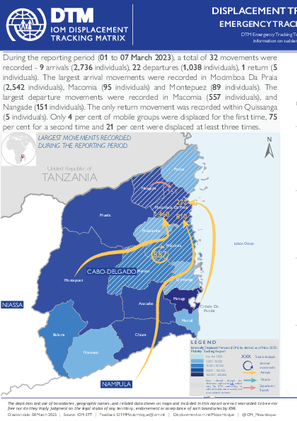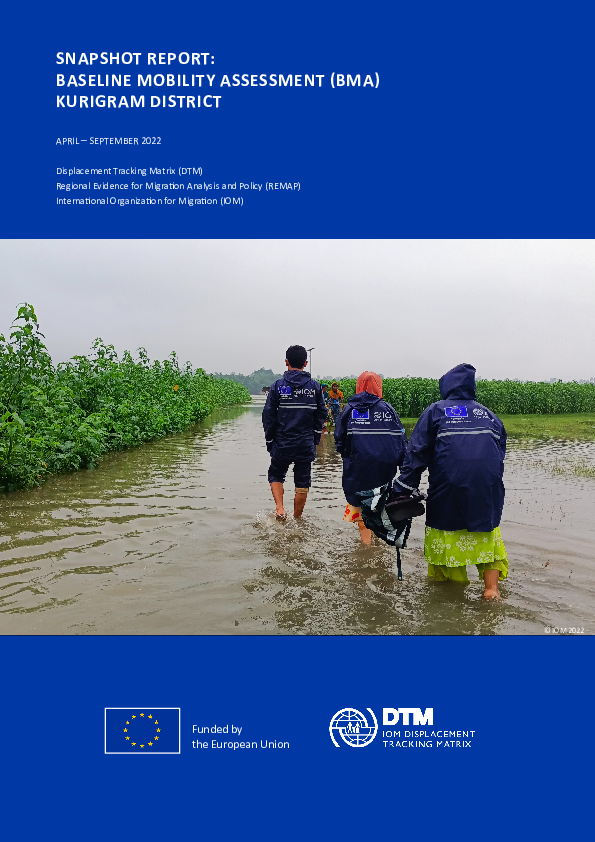-
Countries
-
Data and Analysis
-
Special Focus
-
Crisis Responses
Mar 10 2023
Print
Countries in this response
- Active DTM operation
- Past DTM operation

Contact
DTMMozambique@iom.int
Language
English
Location
Mozambique
Period Covered
Mar 01 2023
Mar 07 2023
Activity
- Mobility Tracking
- Event Tracking
During the reporting period (01 to 07 March 2023), a total of 32 movements were recorded - 9 arrivals (2,736 individuals), 22 departures (1,038 individuals), 1 return (5 individuals). The largest arrival movements were recorded in Mocimboa Da Praia (2,542 individuals), Macomia (95 individuals) and Montepuez (89 individuals). The largest departure movements were recorded in Macomia (557 individuals), and Nangade (151 individuals). The only return movement was recorded within Quissanga (5 individuals). Only 4 per cent of mobile groups were displaced for the first time, 75 per cent for a second time and 21 per cent were displaced at least three times.

Contact
DTM Cameroon, DTMCameroun@iom.int
Language
English
Location
Cameroon
Period Covered
Mar 08 2023
Mar 09 2023
Activity
- Mobility Tracking
- Event Tracking
Selon les informations reçues, depuis la fin du mois de juillet jusqu’en décembre 2022, le bassin du lac Tchad a été sujet à des attaques des GANEs et enlèvements répétitifs. Cette situation avait poussé plusieurs ménages à se déplacer de manière progressive dans l’arrondissement de Darak pour trouver refuge dans plusieurs localités qu’elles estiment plus stables.

Contact
dtmremapsupport@iom.int, remapbd@iom.int
Language
English
Location
Bangladesh
Period Covered
May 01 2022
Aug 31 2022
Activity
- Mobility Tracking
- Baseline Assessment
The Baseline Mobility Assessment (BMA) is part of the European Union-funded Displacement Tracking Matrix (DTM) project "Regional Evidence for Migration Analysis and Policy" (REMAP). The objective of DTM REMAP is to strengthen the evidence-based formulation and implementation of humanitarian and development policy and programming on migration and forced displacement. The International Organization for Migration (IOM) in partnership with the Government of Bangladesh, Ministry of Expatriate Welfare and Overseas employment (MoEWOE) began implementing Baseline Mobility Assessments (BMA) in Bangladesh to increase understanding of internal and international mobility in Bangladesh. This report presents the findings of the BMA data which was collected between May and August 2022 in Satkhira district using time frames: 2020 and 2021. DTM REMAP enables IOM and its partners to maximize resources, set priorities, and deliver better-targeted, evidence based, mobility-sensitive and sustainable humanitarian assistance and development programming.

Contact
dtmremapsupport@iom.int, remapbd@iom.int
Language
English
Location
Bangladesh
Period Covered
Apr 01 2022
Sep 30 2022
Activity
- Mobility Tracking
- Baseline Assessment
The Baseline Mobility Assessment (BMA) is part of the European Union-funded Displacement Tracking Matrix (DTM) project "Regional Evidence for Migration Analysis and Policy" (REMAP). The objective of DTM REMAP is to strengthen the evidence-based formulation and implementation of humanitarian and development policy and programming on migration and forced displacement. The International Organization for Migration (IOM) in partnership with the Government of Bangladesh, Ministry of Expatriate Welfare and Overseas Employment (MoEWOE) began implementing Baseline Mobility Assessments (BMA) in Bangladesh to increase understanding of internal and international mobility in Bangladesh. This report presents the findings of the BMA data which was collected between April and September 2022 in Kurigram district using time frames: 2020 and 2021. DTM REMAP enables IOM and its partners to maximize resources, set priorities, and deliver better-targeted, evidence based, mobility-sensitive and sustainable humanitarian assistance and development programming.
Mar 09 2023
Print
Countries in this response
- Active DTM operation
- Past DTM operation

Contact
DTM Europe, DTMMediterranean@iom.int
Language
English
Location
France
Period Covered
Aug 01 2022
Dec 31 2022
Activity
- Survey
Entre août et décembre 2022, l'OIM France a mené une enquête auprès des ressortissants de pays tiers (RPT) déplacés d'Ukraine en France. L'étude vise à recueillir des informations sur les profils, le parcours et les intentions des ressortissants non-ukrainiens qui ont fui l'Ukraine en raison du conflit armé. L'OIM France a collecté ces informations sur le territoire national, avec en particulier le soutien de quatre ONGs (Entraide Pierre Valdo, France Fraternités, Pottal Fii Bhantal France, Maison des Camerounais de France). Au total, 52 ressortissants étrangers déplacés d'Ukraine ont accepté de répondre volontairement et anonymement à l'enquête menée par le personnel de l'OIM (47 entretiens en personne et 5 par téléphone). Les résultats sont basés sur un échantillon de convenance, ce qui signifie que les résultats s'appliquent uniquement aux personnes interrogées dans le cadre de l'enquête, et non à la population générale.
Synthèse : D'un point de vue sociodémographique, 71 % des RPT interrogés sont des hommes et 58% d'entre eux sont originaires d'Afrique de l'Ouest et d'Afrique centrale ; 73 % ont entre 18 et 30 ans. Environ 80 % des personnes interrogées sont étudiantes, dont 42 % inscrits en licence et 10 % en master. La moitié des RPT résidaient en Ukraine depuis au moins trois ans avant le début du conflit. 71 % ont déclaré être célibataires, et parmi les personnes mariées, près de la moitié le sont à des ressortissants ukrainiens. Environ 85 % des RPT ont voyagé avec des membres de leur famille ou des amis. Pour 73 % des interviewés, la France était la destination envisagée. Parmi eux, 40 % justifient leur choix par leur connaissance de la langue française. Les personnes interrogées ont indiqué avoir fait face pendant le voyage à différentes difficultés, dont l'extorsion, la coercition, les menaces ainsi que le stress (environ 70 %). Plus de 50 % des RPT ont déclaré avoir subi de la discrimination, de la xénophobie et du racisme, en particulier lors du passage de la frontière pour quitter l'Ukraine. Les RPT ont fait état de besoins immédiats en matière d'obtention de permis de séjour (65%), de soins médicaux (46%) ou encore de logement temporaire (42%).
Contact
DTMUkraine@iom.int
Location
Ukraine
Activity
- Survey
- Return Intention
Period Covered
Jan 01 2023 -Feb 28 2023
In round 1, out of the 65 return locations assessed, 12 recorded high severity conditions for one or more driver. This equates to around 15 per cent of the estimated returnee population in assessed settlements residing in high severity conditions (equivalent to 83,000 people).
This is a restricted dataset. To get access, kindly click on the 'Request Access' button.
Population Groups
Survey Methodology
Unit of Analysis Or Observation
Type of Survey or Assessment
Keywords
Geographical Scope
Administrative boundaries with available data
The current dataset covers the following administrative boundaries

Contact
DTM South Sudan, SouthSudanDTM@iom.int
Language
English
Location
South Sudan
Period Covered
Jun 06 2022
Jul 06 2022
Activity
- Survey
- Displacement Solutions
- Return Intention
A quantitative and qualitative survey was carried out within four counties in Central Equatoria State: Kajo-Keji, Lainya, Morobo and Yei. These counties were targeted for Reconciliation, Stabilization and Resilience area-based programming. In each of the four counties, areas within the capital city and accessible locations that were experiencing return of internally displaced persons (IDPs) were assessed.
Return and Reintegration Index
The Return and Reintegration Index combines data (the numerical version of the data) from eight indicators (8 key areas: housing, livelihoods, WASH, health, education, social cohesion, community stability and protection) into a single number that provides an indication of the favourability of conditions (Stability Index) to the return and reintegration of displaced people. The calculation of the index was done at the household level.
The index score ranges from 0 to 10 where the higher the index the more favourable the conditions are for the return and reintegration of IDPs and refugees.
The calculation of the index was done at the household level and the results were aggregated at all administrative levels and by population type.
The average (mean) index score is 6.40 out of 10 and the median index score is 6.75 out of 10.
A median value higher than the mean value shows that data is slightly skewed to the left (negatively skewed), i.e., most of the households have an Index at around 6.75 but the households that have a low Index bring down the average to 6.40.
Contact
iomkenyaPI@iom.int
Location
Kenya
Activity
- Mobility Tracking
- Site Assessment
- Baseline Assessment
Period Covered
Nov 21 2022 -Dec 01 2022
The data collection was conducted across the entire nine sub-counties of Marsabit County in 19 Wards, 134 sub-locations and 1,045 settlements.
Population Groups
Survey Methodology
Unit of Analysis Or Observation
Type of Survey or Assessment
Keywords
Geographical Scope
Administrative boundaries with available data
The current dataset covers the following administrative boundaries